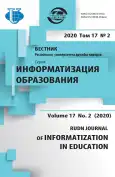Hybrid environments for training engineering students the basics of working with geodetic equipment
- 作者: Dudysheva E.V.1, Solnyshkova O.V.2
-
隶属关系:
- Shukshin Altai State University for Humanities and Pedagogy
- Novosibirsk State University of Architecture and Civil Engineering (Sibstrin)
- 期: 卷 17, 编号 2 (2020)
- 页面: 94-106
- 栏目: INNOVATION PEDAGOGICAL TECHNOLOGIES IN EDUCATION
- URL: https://journal-vniispk.ru/2312-8631/article/view/321240
- DOI: https://doi.org/10.22363/2312-8631-2020-17-2-94-106
- ID: 321240
如何引用文章
全文:
详细
Problem and goal. The article describes an approach to solving the actual problem of identifying effective and approved by students blended learning tools in the initial stages of working with equipment for engineering education courses. The goal of the research was to study the applicability of hybrid environments of simplified configuration for learning work with geodetic equipment based on interactive virtual educational tools and students' mobile devices in the Novosibirsk State University of Architecture and Civil Engineering (Sibstrin). Methodology. A variant of hybrid laboratories with a virtual component and a variable (on-site or mobile) physical component is quite new for pedagogical research. The physical component is important when learning geodetic equipment since stationary devices are studied at university laboratories when portable analogs are used in real geodetic practice. The virtual component of a hybrid environment during initial work with engineering equipment can be represented by a set of multimedia educational tools that simulate the operation of engineering instruments and devices with a high degree of interactivity which available on one online platform for a specific engineering course. Results. The study found that the presented configuration of the hybrid environment is effectively applicable for initial work with geodetic equipment and is approved by students both during laboratory work in an on-site stationary laboratory, as well when using portable equipment and mobile devices in geodetic practice. Conclusion. For the initial stages of training students for working with geodetic equipment, a hybrid learning environment configuration is proposed based on interactive virtual educational tools and mobile devices which is an affordable and functional solution for engineering universities. Virtual e-learning tools can be accumulated on the site with online support for a separate engineering course and supplemented by means of distance interaction and cooperation of the lecturer and students. The hybrid environment can be used for initial training when working in a stationary laboratory or for conducting a professional business game or individual practical tasks on the ground with portable geodetic equipment.
作者简介
Elena Dudysheva
Shukshin Altai State University for Humanities and Pedagogy
编辑信件的主要联系方式.
Email: dudysheva@yandex.ru
candidate of pedagogical sciences, assistant professor of the department of mathematics, physics, informatics
53 Vladimira Korolenko St, Biysk, 659333, Russian FederationOlga Solnyshkova
Novosibirsk State University of Architecture and Civil Engineering (Sibstrin)
Email: o_sonen@mail.ru
candidate of pedagogical sciences, head of department of engineering geodesy
113 Leningradskaya St, Novosibirsk, 630008, Russian Federation参考
- Alexeychik LV, Zhokhova MP, Mikheev DV, Karpunina MV. Electrotechnical laboratory: from physical experiment to virtual scenario. Proceedings of 4th International Conference on Information Technologies in Engineering Education (INFORINO). 2018;8581853.
- Auer M, Pester A, Ursutiu D, Samoila C. Distributed virtual and remote labs in engineering. Proceedings of Industrial Technology – IEEE International Conference. 2003;2:1208–1213.
- Bowyer J, Chambers L. Evaluating blended learning: bringing the elements together. Research Matters, UCLES. 2017;23:17–26.
- Crompton H, Burke D. The use of mobile learning in higher education: a systematic review. COMPUT EDUC. 2019;123(1):53–64.
- Grindei L, Vlaicu A, Orza B, Topa V, Munteanu C. On line web course for engineering. Proceedings of ACOS 07 – 6th WSEAS International Conference on Applied Computer Science (p. 66). 2007.
- Delialioğlu Ö. Student engagement in blended learning environments with lecture-based and problem-based instructional approaches. JET&S. 2012;15(3):310–322.
- De Souza e Silva A. From Cyber to Hybrid. Space and Culture. 2006;9(3):261–278.
- Elawady Y, Tolba A. Educational Objectives of Different Laboratory Types: A Comparative Study. IJCSIS. 2009;6(2):89–96.
- El-Mowafy A, Kuhn M, Snow T. Blended learning in higher education: current and future challenges in surveying education. Issues in Educational Research. 2013;23(2):132–150.
- Estriegana-Valdehita R, Barchino Plata R, Medina-Merodio J-A. Educational technology in flipped course design. IJEE. 2017;33(4):1199–1212.
- Hernandez-de-Menendez M, Vallejo Guevara A, Morales-Menendez R. Virtual reality laboratories: a review of experiences. IJIDEM. 2019;13(3):947–966.
- Henke K, Ostendorff S, Wuttke H-D, Vietzke T, Lutze C. Fields of applications for hybrid online labs. iJOE. 2013;9:1–8.
- Klemes JJ, Varbanov PS, Lam HL. Improving learners engagement with use of hybrid approaches in engineering education. Proceedings of 4th International Conference on Process Integration, Modeling and Optimization for Energy Saving and Pollution Reduction (PRES). 2011;25:471.
- Olympiou G, Zacharia ZC. Blending physical and virtual manipulatives: An effort to improve students' conceptual understanding through science laboratory experimentation. Science Education. 2012;96(1):21–47.
- Potkonjak V, Gardner M, Callaghan V, Mattila P, Guetl C, Petrovi VM, Jovanovi K. Virtual laboratories for education in science, technology, and engineering: a review. Computers & Education. 2016;95:309–327.
- Rivera LFZ, Larrondo-Petrie MM. Models of remote laboratories and collaborative roles for learning environments. Proceedings of 13th International Conference on Remote Engineering and Virtual Instrumentation (REV) (p. 423–429). 2016.
- Salzmann C, Gillet D. Remote labs and social media: agile aggregation and exploi- tation in higher engineering education. IEEE EDUCON Education Engineering 2011 (p. 307–311). 2011.
- Solnyshkova O, Dudysheva E. Interactive multimedia educational resources for training of students of architectural and civil engineering university at working with geodetic equipment. Proceedings of 4th International Conference on Information Technologies in Engineering Education (INFORINO). 2018;8581861.
- Šimonová I. Mobile-assisted ESP learning in technical education. JoLaCE. 2015;3(3):1–15.
- Tawfik M, Salzmann C, Gillet D, Lowe D, Saliah-Hassane H, Sancristobal E, Castro M. Laboratory as a service (LaaS): a novel paradigm for developing and implementing modular remote laboratories. iJOE. 2014;10(4):13–21.
- Žuvić M, Rončević N, Nemcanin D, Nebic Z. Blended e-learning in higher education: research on students’ perspective. Issues in Informing Science and Information Technology. 2011;8:409–429.
补充文件









